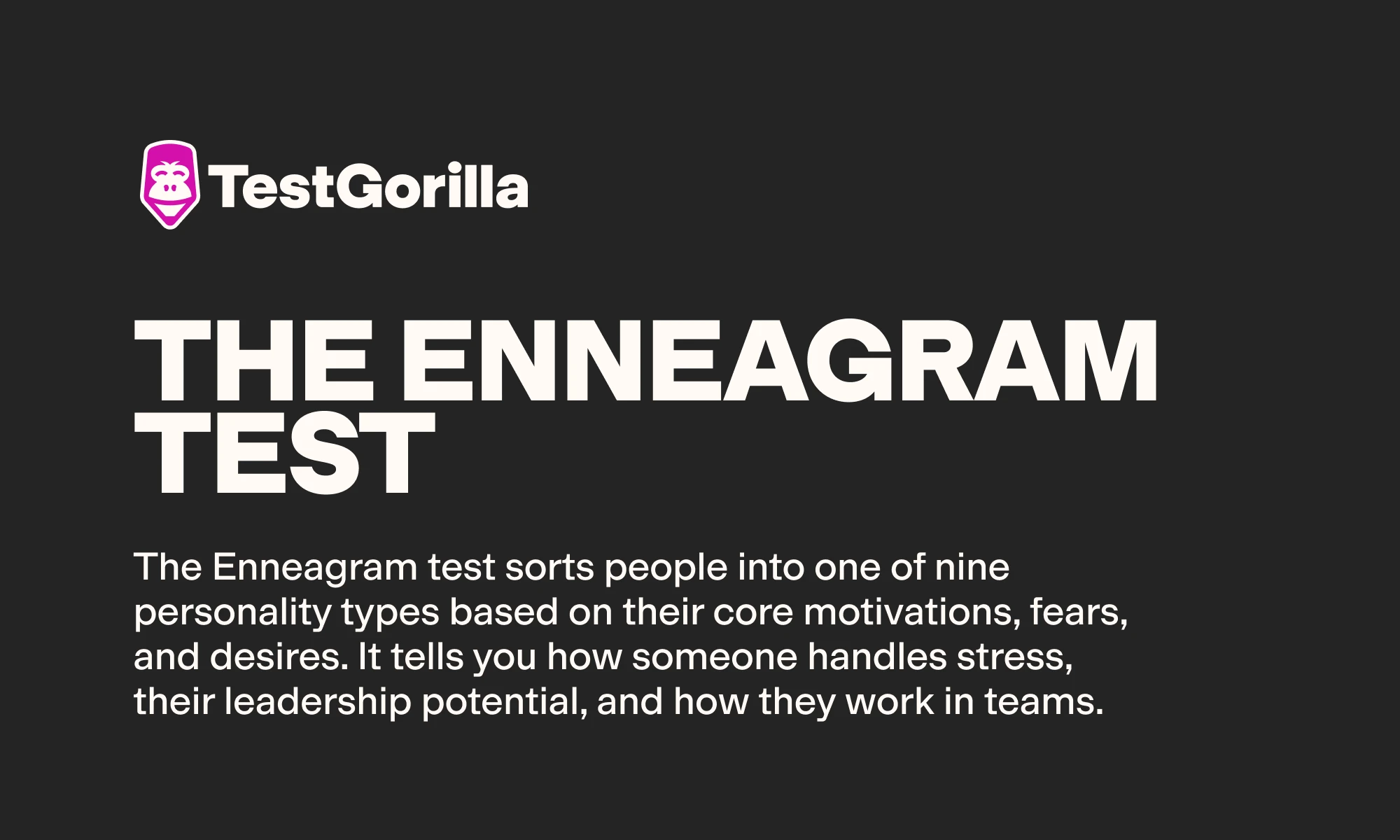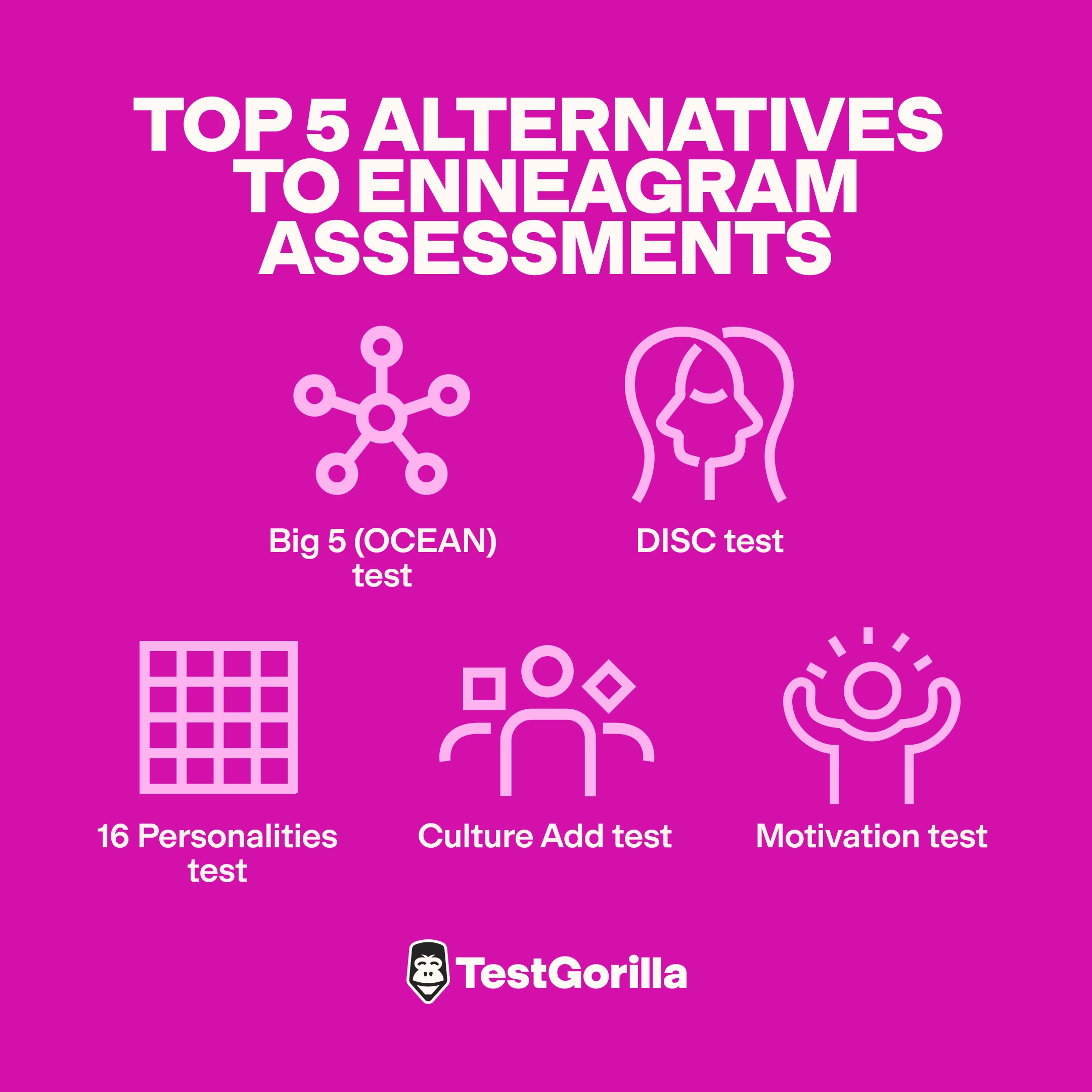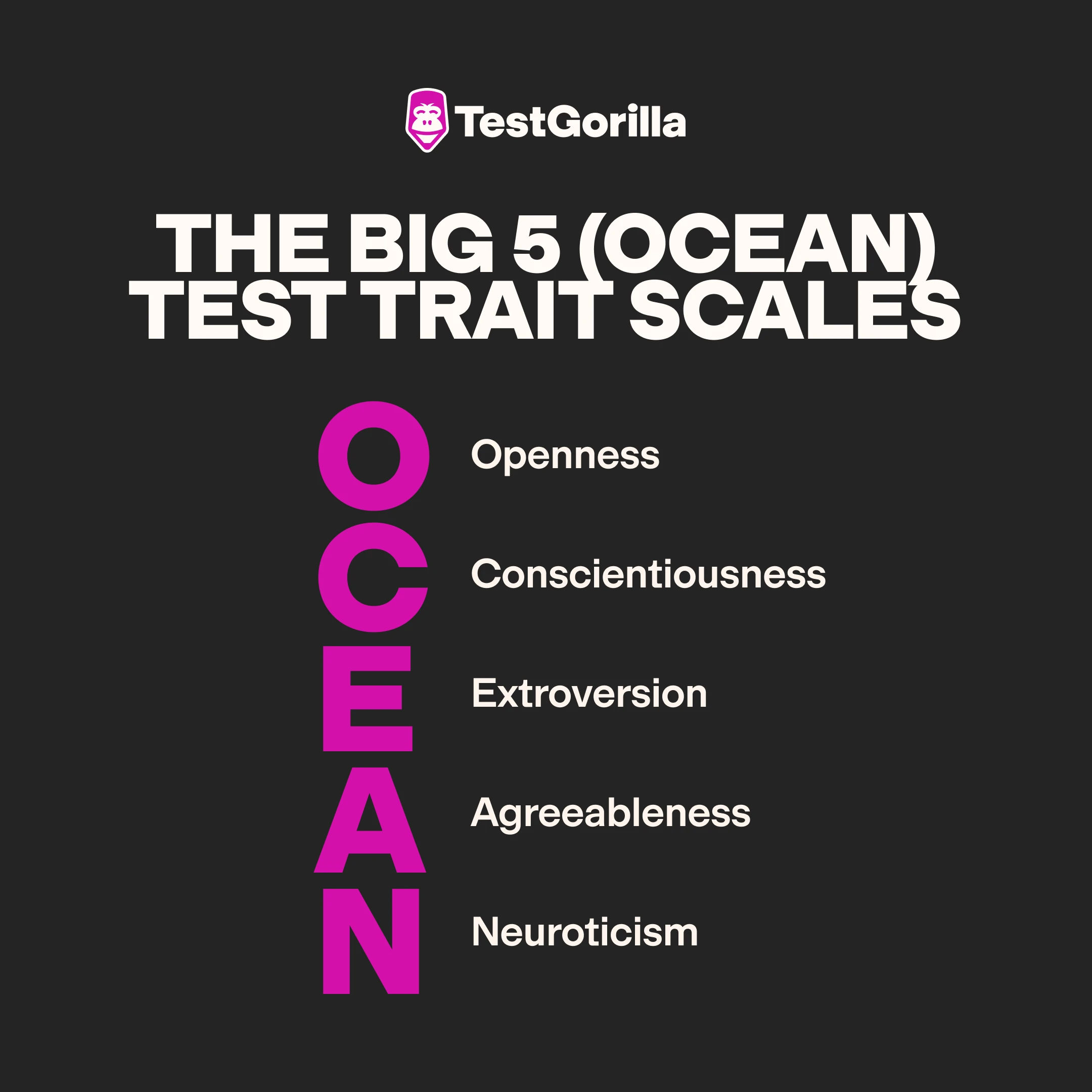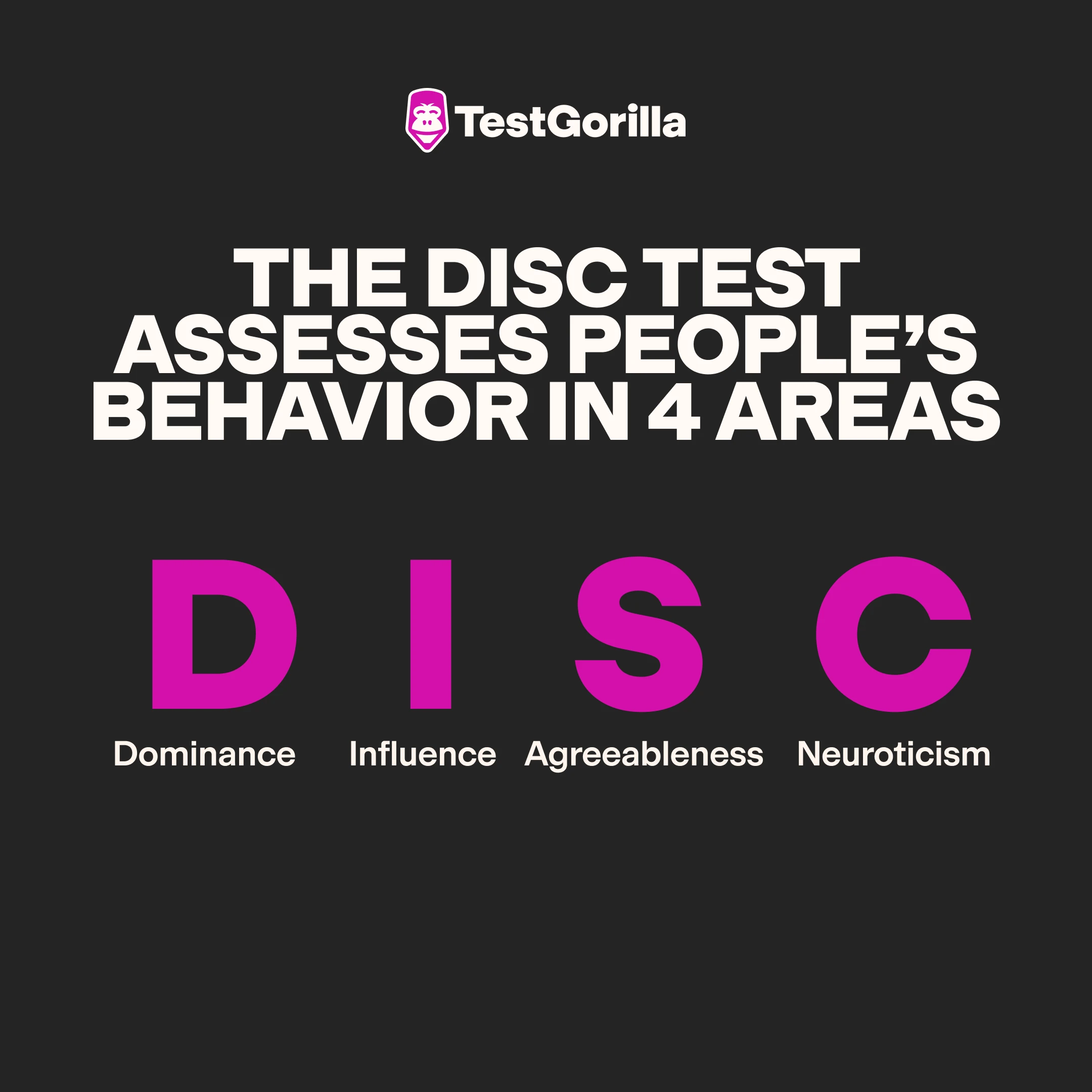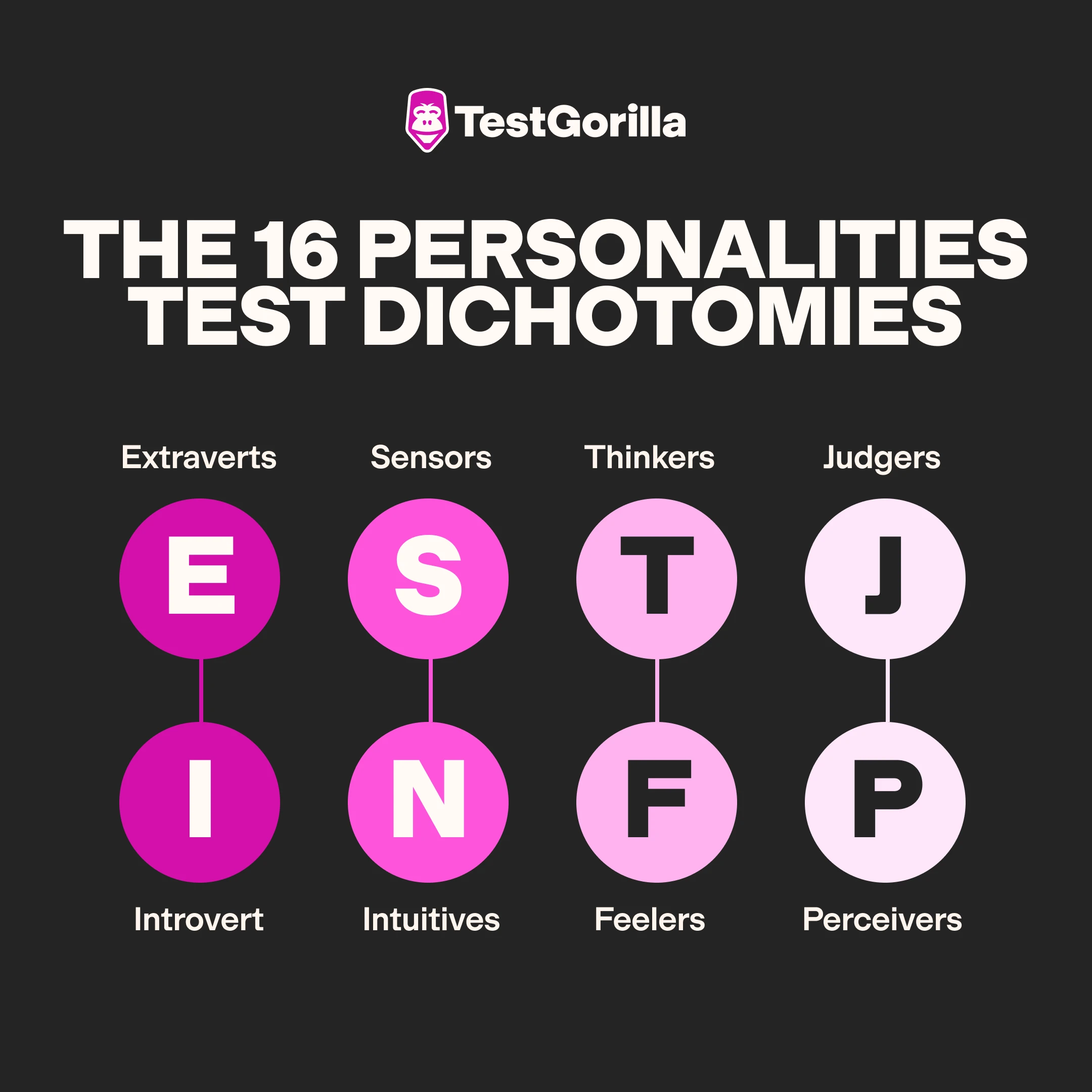Top 5 alternatives to Enneagram assessment: Best personality tests for hiring
When hiring, personality tests can help you uncover how candidates might perform in the workplace, collaborate with your existing team, and more.
The Enneagram is one personality test often used to explore motivations and emotional drivers, but it may not fully address other important traits for workplace success. For a broader understanding of candidates, you’ll want to consider alternatives to the Enneagram.
Not sure where to start? We’ll lend a hand. This guide highlights five alternative personality tests that focus on behaviors, values, and work styles, helping you make smarter hiring decisions. Plus, we explain how they work and when to use them.
Key Takeaways
The Big 5 (OCEAN) test gives you a solid look at five core personality traits. It’s great for roles where emotional intelligence, adaptability, and flexibility really matter.
The DISC test helps determine how candidates communicate and behave at work. It’s fantastic for spotting team-building traits and leadership potential.
The 16 Personalities test is all about how people make decisions and process info, so it’s handy for matching candidates with roles that suit their way of thinking and working.
The Culture Add test finds people who’ll not only fit in but also bring fresh ideas to help your company grow in diversity and innovation.
The Motivation test, based on Oldham & Hackman’s model, shows what gets candidates excited about work, making sure you can keep them happy and productive.
Understanding the Enneagram test
The Enneagram test sorts people into one of nine personality types based on their core motivations, fears, and desires. It tells you how someone handles stress, their leadership potential, and how they work in teams. This makes it useful for hiring, especially in roles that need emotional intelligence, self-awareness, and strong people skills.
One downside is that the Enneagram focuses more on internal motivations than specific behaviors or job-related skills. While it offers a deep dive into personality, it might not be as quick or job-specific as other assessments.
1. Big 5 (OCEAN)
How it works
The Big 5 (OCEAN) test is a 10-minute self-evaluation where candidates rate how well certain statements describe them on a scale from 1 (very inaccurate) to 5 (very accurate).
What it tests for
Unlike the Enneagram, which puts people into nine types, the Big 5 offers a more flexible look at personality by measuring five key traits on a sliding scale:
Openness: How open someone is to new experiences.
Conscientiousness: How organized a person is.
Extraversion: How outgoing and energetic someone is.
Agreeableness: How compassionate and friendly a person is.
Neuroticism: How sensitive or resilient someone is.
When to use it
This test works best when you want to understand how someone works, handles stress, fits into a team, and leads others. It’s perfect for leadership, teamwork, customer service, and creative roles requiring flexibility, emotional balance, and teamwork.
⭐ Learn more by exploring our Big 5 (OCEAN) Personality test page. Then, check out our guides on using the Big 5 test when hiring and interpreting the Big 5 test scores.
The best insights on HR and recruitment, delivered to your inbox.
Biweekly updates. No spam. Unsubscribe any time.
2. DISC
How it works
The DISC test is a 10-15 minute self-assessment where candidates rate 20-75 statements on a scale from 1 (very inaccurate) to 5 (very accurate). It looks at four key traits:
Dominance: How they handle challenges.
Influence: How they interact with others.
Steadiness: How they respond to pace and consistency.
Conscientiousness: How they follow rules and pay attention to details.
What it tests for
DISC reveals how someone behaves at work – whether they’re more dominant, social, calm, or detail-oriented.
When to use it
The DISC test is ideal for hiring in roles that require strong teamwork and communication skills. It’s handy for positions like marketing strategists, HR professionals, event coordinators, and educators, where effective collaboration and understanding different communication styles are must-haves.
⭐ Curious to learn more about our DISC Personality test and add this test to a hiring assessment? Head to our DISC Personality test page. For deeper insights, read our article on how DISC assessments help recruiters.
3. 16 Personalities (MTBI)
How it works
The 16 Personalities test, based on the Myers-Briggs Type Indicator (MBTI), categorizes people into 16 types based on how they think and make decisions.
It’s a 10-15 minute self-assessment where candidates rate how much they agree with various statements. It observes four dichotomies:
Extraversion/Introversion
Sensing/Intuition
Thinking/Feeling
Judging/Perception
What it tests for
The 16 Personalities test shows you how candidates process information and communicate, helping you understand their work style and team role.
When to use it
The 16 Personalities test is great for hiring when you need a range of traits. It’s useful for technical roles like software developers, project managers, content creators, data analysts, and UX designers, where different thinking and decision-making styles can complement each other.
⭐ To learn more about TestGorilla’s 16 Personalities test and add this test to a hiring assessment, check out our 16 Personalities test page. You can also check out our guide that explains how to interpret 16 Personalities test results.
4. Culture Add
How it works
In the Culture Add test, candidates are presented with scenarios or statements about their workplace behavior, values, and attitudes. They then rate how much they agree with each statement.
The assessment takes about 15-20 minutes.
What it tests for
The Culture Add test measures how well a candidate’s values fit your organization’s values and whether their ideas will strengthen teamwork and drive innovation.
When to use it
This test is ideal for building diverse, innovative teams or during periods of cultural change. It’s great for roles in product development, creative teams, engineering, and marketing, where you need people who align with your company’s culture while bringing fresh ideas and perspectives.
In general, the Culture Add test is excellent for bringing objectivity into hiring for culture.
⭐ Head to our Culture Add test page to learn more about this test and how to add it to an employee assessment.
5. Motivation
How it works
Candidates complete a 15-minute survey where they rate how much they agree with statements about what they enjoy in a job. The test measures five key job characteristics:
Task identity
Task significance
Skill variety
Feedback
Autonomy
What it tests for
Based on Oldham & Hackman’s Job Characteristics Model, the Motivation test measures certain aspects of work impact a candidate’s motivation and satisfaction.
While the Enneagram looks at inner fears and desires, this test focuses on how the job itself influences performance. It shows you what type of work and environment a candidate will be most motivated and satisfied working in.
When to use it
The Motivation test is ideal for assessing candidates for roles where motivation is crucial – such as team leads, project managers, software developers, engineers, and content strategists. Likewise, it’s perfect when hiring for positions that require independence, long-term focus, or high engagement.
⭐ Curious to know more about this test? Check out our Motivation test page.
Hire better candidates with TestGorilla
Personality tests like the Big 5, DISC, and 16 Personalities may give you a better idea of a candidate’s behavior, decision-making style, and motivations than the Enneagram test – making them great tools for hiring.
However, to get a complete view of a candidate, you should pair personality tests with a skills-based hiring approach.
TestGorilla makes skills-based hiring easy – and more reliable, fair, and cost-effective than traditional methods – with our library of more than 350+ tests. You can test for job-specific skills, cognitive ability, personality traits, and so much more.
Ready to revamp your hiring process? Sign up for a free TestGorilla plan or book a free live demo to get started today!
FAQs
What is the rarest Enneagram type?
Type Five, referred to as the Pioneer or Investigator, is the rarest Enneagram personality type. These individuals are highly curious and driven by a desire to deepen their understanding of the world. They seek to gain new knowledge and skills, aiming to become experts in their fields to ensure their independence and self-sufficiency.
Is Enneagram or MBTI more accurate?
The MBTI looks at four separate personality traits, while the Enneagram sees these traits as connected and influencing each other. This allows the Enneagram to give a more complete and accurate picture of someone’s personality.
What do psychologists think of Enneagram?
Many psychologists consider the Enneagram a useful tool for self-awareness and understanding personality differences. It's also used to compare personality types to disorders and explore what motivates people.
You've scrolled this far
Why not try TestGorilla for free, and see what happens when you put skills first.


